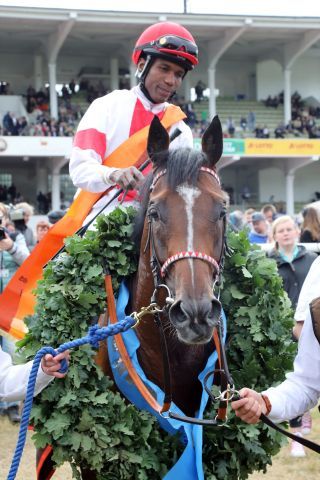Folgen
@turftimes folgen
Drucken
Redaktion
Startseite
Verwandte Artikel:
18.04.24
Die erste klassische Siegerin der Saison in der osteuropäischen Region heißt Reshiram (Gleneagles). Die von Pál Csontos trainierte Stute des ambitionierten Stalles Jazy Team holte sich am vergangenen Sonntag die ungarischen 1000 Guineas -... weiterlesen »
18.04.24
Last weekends racing in Dusseldorf featured Germanys first Group race of the year. The Frühjahrs-Meile (1mile) for 4-year-olds and upwards attracted a strong field of twelve including two from France, Gamestop (Lope de Vega) from... weiterlesen »
11.04.24
This was one of the weekends when I thought I would not have much to write about. But surprise, surprise even with moderate racing at Mannheim, a small German country track and then an average card in Mulheim an der Ruhr, there was just... weiterlesen »
11.04.24
Es ist wieder so weit. Das erste April-Wochenende macht traditionsgemäß den Anfang der neuen Saison in der ehemaligen Tschechoslowakei, im Budapester Kincsem Park wird bereits seit Ostern galoppiert. Im Großen und Ganzen kann man mit dem... weiterlesen »
03.04.24
Well last weekend’s racing ended as we expected it would. Berlin-Hoppegarten opened its gates to 12.500 racing fans and friends, and they were treated to some fine racing so early in the turf season. It’s not often anywhere in the world,... weiterlesen »
27.03.24
It´s nice to get back writing this article again as it means we have got through the winter and can look forward to hopefully another exciting grass season.Dortmund kept us going as usual in Winter and though it cared for the German racing... weiterlesen »
01.02.24
Es ist ein weiterer Meilenstein in der nicht so langen Geschichte des Familien-Rennstalles Nieslanik, dessen orange-weißen Farben in den letzten Jahren auch in Deutschland unterwegs sind. Der 6-jährige Ponntos (Power) wurde am vergangenen... weiterlesen »
18.01.24
With this being the first issue of the New Year, I would like to start off by wishing all our readers a happy and prosperous 2024. One of the unfinished pieces of the 2023 race season, was the trainers championship which went down to the... weiterlesen »
21.12.23
The end of the year is closing in fast now, but we will have two race meetings to see the 2023 season out. Weather permitting on Boxing Day, Mulheim will see a final grass meeting and then on the 30th of December, Dortmund on its sand... weiterlesen »
07.12.23
The last couple of weekends in our sport reflects in my opinion the general state of affairs in German Racing. Let’s go back two weekends ago and the last time we had racing in Germany, Munich’s last Raceday on the 25th of November somehow... weiterlesen »
Block: Sidebar Square
Google AdSense 250x250
Google AdSense 250x250
Termine
Sa.
20.04.
20.04.
So.
21.04.
21.04.
13:00 Uhr - Renntag
Köln - 2. Renntag
Carl Jaspers Preis, Gr. II | Karin Baronin von Ullmann - Schwarzgold-Rennen, Gr. III
Köln - 2. Renntag
Carl Jaspers Preis, Gr. II | Karin Baronin von Ullmann - Schwarzgold-Rennen, Gr. III
So.
21.04.
21.04.
So.
28.04.
28.04.
So.
28.04.
28.04.
Mi.
01.05.
01.05.
Mi.
01.05.
01.05.
Mi.
01.05.
01.05.
So.
05.05.
05.05.
So.
05.05.
05.05.
Do.
09.05.
09.05.
Do.
09.05.
09.05.
Sa.
11.05.
11.05.
So.
12.05.
12.05.
So.
12.05.
12.05.
Sa.
18.05.
18.05.
So.
19.05.
19.05.
Mo.
20.05.
20.05.
Mo.
20.05.
20.05.
Sa.
25.05.
25.05.
So.
26.05.
26.05.
Do.
30.05.
30.05.
Fr.
31.05.
31.05.
Sa.
01.06.
01.06.
So.
02.06.
02.06.
Sa.
08.06.
08.06.
So.
09.06.
09.06.
So.
09.06.
09.06.
So.
09.06.
09.06.
Sa.
15.06.
15.06.
So.
16.06.
16.06.
So.
16.06.
16.06.
Do.
20.06.
20.06.
Sa.
22.06.
22.06.
So.
23.06.
23.06.
Mo.
24.06.
24.06.
Sa.
29.06.
29.06.
So.
30.06.
30.06.
Mi.
03.07.
03.07.
Do.
04.07.
04.07.
Sa.
06.07.
06.07.
So.
07.07.
07.07.
10:30 Uhr - Renntag
Hamburg - 5. Renntag
Idee 155. Deutsches Derby, Gr. I | BBAG Meiler-Auktionsrennen, Kat. C | BBAG Steher Auktionsrennen, Kat. C
Hamburg - 5. Renntag
Idee 155. Deutsches Derby, Gr. I | BBAG Meiler-Auktionsrennen, Kat. C | BBAG Steher Auktionsrennen, Kat. C
Sa.
13.07.
13.07.
So.
14.07.
14.07.
So.
14.07.
14.07.
Sa.
20.07.
20.07.
So.
21.07.
21.07.
So.
21.07.
21.07.
Do.
25.07.
25.07.
So.
28.07.
28.07.
So.
28.07.
28.07.
So.
28.07.
28.07.
Block: Adsense 728 x 90
Google AdSense 728x90
Google AdSense 728x90
Impressum - Datenschutzerklärung - Kontakt
©2010-2013 Dequia Media in Kooperation mit Turf-Times















